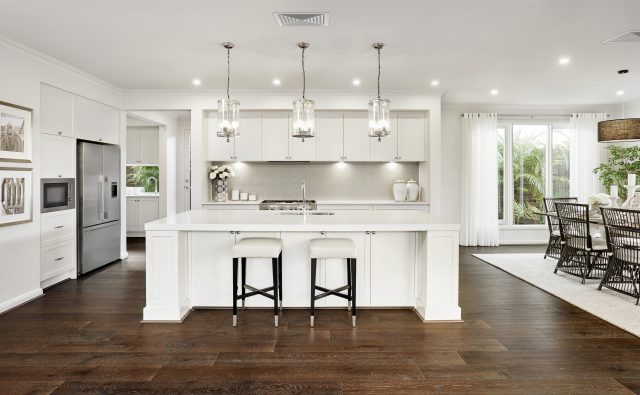[ad_1]
For most Australians, our air conditioning units are one of the most important features in our homes, keeping our air cool and dry throughout the humid summer months and warmer when the winter chills set in.

However, like all essential appliances air conditioners do not last forever. They need to be maintained and occasionally repaired, replaced, or even upgraded if living conditions have changed.
Here’s how you can determine where your air conditioner is in its lifecycle.
Is my air conditioner due for a repair?
If your air conditioner is displaying any of these symptoms, it may need to be repaired, or even replaced.
- Warm air instead of cool air. If your air conditioner is blowing warm air, it could be a sign of low refrigerant levels, clogged filters or a failing compressor.
- Strange noises. Unusual noises such as hissing, banging, or rattling could indicate a problem with the motor, fan or ductwork.
- Poor airflow. If the airflow from your air conditioner vents is weak, it may be due to dirty air filters or a clogged air duct. Simple maintenance could solve the problem before any damage is caused.
- Uneven cooling. If some rooms in your home are cool and others are warm, it could be a sign of ductwork issues or refrigerant leaks.
- Increased energy bills. A malfunctioning air conditioner will consume more energy, resulting in higher energy bills. If you’ve noticed an unusual spike that isn’t related to current climate conditions, it might be worth having a technician take a look.
- Bad odours. Foul odours coming from your air conditioning unit could indicate the presence of mould or bacteria, which can be harmful to your health.
- Poor indoor air quality. Sneezing, itching, or watery eyes are all symptoms of poor air quality in your home, which could be caused by filters that need to be cleaned or replaced.
- Leaks. Puddles on the floor or wet streak marks running down the walls can indicate your air conditioner has a leak which can be caused by a clogged drain line or a damaged pipe or coil.

Is my air conditioner due for a replacement?
There are several reasons why you may need to replace your air conditioning unit. Ideally, you’ll want to do so before peak summer or winter, but if your air conditioner is not behaving as expected, get it checked. Your technician will know whether it is more cost-effective to repair the unit or replace it.
- Age. The average lifespan of an air conditioning unit is 10 to 15 years. If your unit is approaching this age range, it may be time to consider a replacement.
- Frequent repairs. If you find yourself having to repair your air conditioner frequently, it may be more cost-effective to replace it.
- Inefficiency. Air conditioners that consume more energy without producing effective cooling as a result can be a reason to explore more efficient models.
- Uncomfortable temperatures. If your air conditioner is unable to maintain comfortable temperatures in your home, it may be a sign that it is too old or too small for your needs.

Is my air conditioner due for an upgrade?
There are many reasons to upgrade your air conditioning unit. Here are a few to consider.
Improved energy efficiency. Upgrading to a newer, more energy-efficient air conditioning unit can help reduce your energy bills and have a positive impact on the environment. Some states offer rebates for more energy-efficient homes.
Better indoor air quality. Upgraded air conditioners often have advanced air filtration systems that can improve the quality of the air in your home.
Increased comfort. A newer, larger air conditioning unit can help maintain more consistent temperatures in your home, leading to greater comfort. Similarly, if your home was built for a family of four, but your kids have recently moved out and fewer rooms are occupied, a change in unit or zone design could drastically improve effectiveness and efficiency.
Enhanced technology. Newer models may offer features such as programmable thermostats, remote control, smart home integration and home sensors for efficiency. Fujitsu General’s anywAiR® technology, for example, offers Wi-Fi control that is operated through the myanywAiR app. The Wi-Fi adaptor plugs easily into select indoor units, allowing you to control the air conditioner from either inside or outside the home using a smartphone or tablet.
Home value. More efficient air conditioning units can enhance the value of your home, making it more attractive to potential buyers or renters.
Extended lifespan. One of the additional perks of an upgrade is that modern units are often built to last longer and require less maintenance, which can save you time and money in the long run.
General home improvements. Home makeovers often go hand-in-hand with newer, more modern styles and features.
Whether it’s time for an upgrade, replacement, or a simple repair, it’s important to address any issues promptly to keep your home healthy and cool. Regular maintenance also prevents damage to your air conditioner and ensures that it operates efficiently. Regular maintenance will also help prolong the lifespan of your unit and keep it running smoothly.
For more information from Fujitsu General

The post When should you repair, replace, or upgrade an air con unit? appeared first on The Interiors Addict.
[ad_2]
theinteriorsaddict.com










